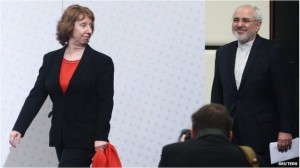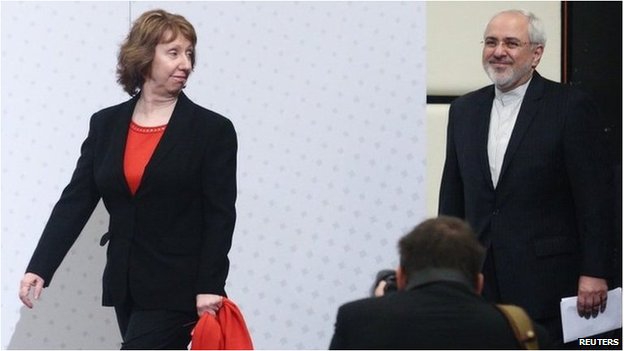 The difficult and delicate process of forging a new relationship between Iran and the West takes another step this weekend with the first visit of Europe's foreign policy chief, Catherine Ashton, to the Islamic Republic.
The difficult and delicate process of forging a new relationship between Iran and the West takes another step this weekend with the first visit of Europe's foreign policy chief, Catherine Ashton, to the Islamic Republic.It will also be a significant challenge for Baroness Ashton as she seeks to build on recent foreign policy successes to broach critical issues ranging from human rights to Tehran's role in regional conflicts including Syria.
On Saturday morning Iranian newspapers, of a more reformist leaning, welcomed her mission, hailing it as an achievement of Iranian President Hassan Rouhani's new approach.
Coverage of her visit, across moderate and hardline media, will underline both the centrality and sensitivity of her role here.
Mrs Ashton has been widely credited with playing a key role in negotiating the landmark interim deal between Iran and world powers last November, which requires Tehran to curb its nuclear programme in exchange for limited relief from sanctions.
Nuclear issues are certain to come up in her meetings since wide gaps still stand in the way of a long-term agreement meant to come into force in July when the interim accord expires.
Charting new course
But the first visit of a senior EU leader since 2008 is primarily a bilateral visit aimed at exploring the potential for a new relationship between Iran and Europe.
"She knows that Iran is about more than the smiling Foreign Minister Javad Zarif with whom she has forged a good working relationship," said one Western diplomat.
Mrs Ashton will need to muster all her diplomatic skills, including what is often called her "softly-softly bridge-building" approach.
Her challenge is to chart a new course between Iran's political factions, as well as European states, which also remain divided over how far and fast this relationship can and should go when mistrust still runs deep, on all sides.
It is understood she is coming to Iran, mainly to listen. But she is expected to urge one of Syrian President Bashar al-Assad's main allies to play a more active role in ending a devastating conflict.
Iranian and European human rights groups have also been lobbying Mrs Ashton to express concern on issues like Iran's use of the death penalty which led to about 500 hangings last year, mainly for drug offences.
Her visit begins on Saturday evening with a meeting with civil society leaders and ends on Monday with a visit to the city of Isfahan, famed for its stunning Islamic architecture.
Sunday will be spent meeting leaders from across the political spectrum including President Rouhani and his most senior foreign policy and security advisers.
There is vast potential to strengthen the Iran-Europe axis in areas ranging from aid, education, the environment, anti-piracy efforts and technology.
But it can only be tapped if there is real and lasting progress on what is still the central issue for the West - the nuclear file.
Western diplomats say much has been achieved but there is still "a long way to go" to ease doubts that Iran's nuclear programme is entirely for peaceful purposes.

Iranian leaders say suspicion of the West's intentions are also deep-rooted.
Mrs Ashton's visit is meant to send a message to Tehran that there is a lot to gain if they stay the course in building a new relationship with the international community.
As one Western diplomat put it, it must show it does want "to play a greater role in the world, not against the world".
By BBC
The Iran Project is not responsible for the content of quoted articles.











